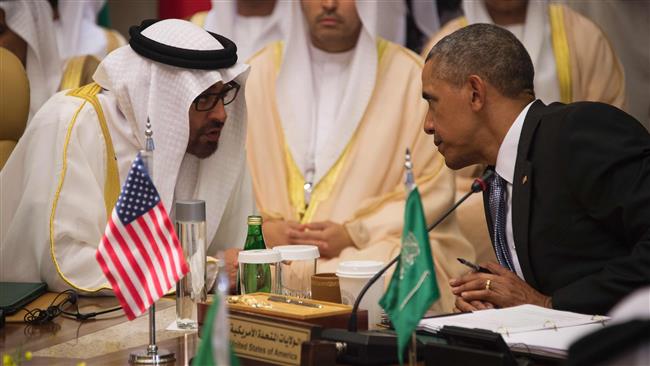-
Tips for becoming a good boxer - November 6, 2020
-
7 expert tips for making your hens night a memorable one - November 6, 2020
-
5 reasons to host your Christmas party on a cruise boat - November 6, 2020
-
What to do when you’re charged with a crime - November 6, 2020
-
Should you get one or multiple dogs? Here’s all you need to know - November 3, 2020
-
A Guide: How to Build Your Very Own Magic Mirror - February 14, 2019
-
Our Top Inspirational Baseball Stars - November 24, 2018
-
Five Tech Tools That Will Help You Turn Your Blog into a Business - November 24, 2018
-
How to Indulge on Vacation without Expanding Your Waist - November 9, 2018
-
5 Strategies for Businesses to Appeal to Today’s Increasingly Mobile-Crazed Customers - November 9, 2018
Obama arrives in Saudi Arabia for talks with Gulf allies
One year after receiving them at Camp David, US President Barack Obama meets Gulf leaders again on Thursday, hoping they can more strongly commit to the fight against jihadists.
Advertisement
President Barack Obama said Thursday the United States is united with Gulf Arab nations in fighting the Islamic State group and sought to reassure them about USA overtures to regional rival Iran.
The president also hoped to use his fourth and probably final trip to the kingdom to dispel some of the frustration felt by Gulf countries toward his administration, in what one senior USA official said was a chance to “clear the air”.
Such assurances are necessary for leaders in a region beset with conflict and instability in Syria, Yemen, Libya and Iraq and an ongoing and destabilizing feud between Saudi Arabia and Iran.
Most of the GCC states, which also include Bahrain and Oman, have been bitterly disappointed in Obama’s presidency, during which they believe the United States has pulled back from the region, giving more space to Iran.
Last spring, Obama promised Saudi Arabia and the smaller Arab states new weapons to help defend against Iranian missiles, maritime attacks and cyberattacks.
“Obama’s visit to Saudi Arabia is for reassurance about Iran in the first place, yet his administration is going through a “lame duck” stage, and so it can not make a significant change in the United States policy in the Arab world”, said al-Lawindi.
“Even with the nuclear deal we recognise collectively that we continue to have serious concerns about Iranian behaviour”, Obama said at the close of a summit in the Saudi capital with the six-nation Gulf Cooperation Council.
A day earlier, the GCC defence ministers and their US counterpart, Ashton Carter, discussed in Riyadh military cooperation and the latest developments in the Middle East, agreeing to carry out joint patrols to stop any Iranian arms shipments reaching Yemen.
The Syrian ceasefire is “under tremendous strain including continued violations” by the government of Syrian president Bashar al-Assad, Obama said. Both moves were interpreted as a result of the recent tensions in relations between the USA and Saudi Arabia.
Obama pledged to remain vigilant against Iran’s destabilizing activities in the Middle East, as he tried to comfort his Gulf allies after bilateral relations were strained by the nuclear deal reached with Iran a year ago.
This is likely to be Mr Obama’s final visit to Saudi Arabia since becoming president.
They were comments aimed at the president’s critics stateside as well as the Gulf leaders.
By all indications, the USA is caught between a rock and a hard place when it comes to Irani-Saudi tensions that have clearly escalated recently.
“I think they both agreed that it was good to have this opportunity to clear the air”, he said.
Saying he’s secured commitments from the assembled leaders to step up assistance to Iraq, Obama said it was too soon to tell where those new resources would be used.
He referred to Iran’s “destabilising activities” in the region but said: “None of our nations have an interest in conflict with Iran”.
“The GCC countries have extensively cooperated with us on counter terrorism, curbing the financing of terrorist activities”, Obama said after the summit.
Riyadh leads an Arab military coalition that for 13 months has supported Yemen’s government in its battle against Iran-backed Shiite Huthi rebels.
Advertisement
DUBAI, United Arab Emirates (AP) – A U.S. Navy officer relieved of commanding a Persian Gulf patrol ship allegedly failed to maintain equipment to the point of exposing “his crew to unnecessary risk”, interfered with an inquiry into his actions and once slept drunk on a bench at a Dubai port, according to a naval investigation.





























